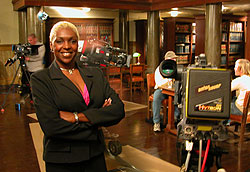Berkeleyan
Berkeley staffer brings admissions process to TV on "The
Scholar"
Starting June 6, Marquesa Lawrence will help decide which young student is going to win a quarter-million-dollar scholarship
![]()
03 June 2005
 Berkeley outreach officer Marquesa Lawrence will give a nationwide television audience a sense of how she does her "dream job" when "The Scholar" debuts next week. (Dan Mogulof photo) |
Each week, the students take quizzes, perform problem-solving exercises, and participate in other tasks designed to reveal personal attributes such as leadership. Lawrence is one of three judges on a "scholarship committee" that assesses the students' performance during each episode. The six-episode show will air Mondays at 8 p.m. beginning June 6.
Lawrence has worked for eight years in what she considers her "dream job." She travels from the San Fernando Valley to San Diego County to meet with students, parents, and high-school counselors to discuss the admissions process and encourage students to prepare for a college education. She also reads and scores applications for freshman admissions. The show's two other judges, as well as two of the show's producers, also have worked in college admissions.
A 34-year-old resident of Long Beach, Lawrence was raised in Compton and attended parochial schools before enrolling at UC Santa Barbara and earning a bachelor's degree in Chicano studies and Spanish.
Janet Gilmore of Public Affairs recently spoke with Lawrence about her unexpected and rewarding role in "The Scholar":
How did your participation in "The Scholar" come about, and what
was your initial reaction?
I received a message from Associate Vice Chancellor [for Admissions and
Enrollment] Richard Black asking if I would like to participate in something
"fun." He notified me that there was a "reality" show focusing
on a competition for a full scholarship for college.
He made sure that I knew it was not a "reality" show where the participants had to do anything quirky or disgusting. It was presented to me in a way that was very low-key and easy. I was also told that the show would really be about what I do as an admissions counselor already and basically that I would just be auditioning. You just assume you're not going to get selected and then, it's like, you got it! And then the show's producers start calling you...
What did you have to do in the audition, and why do you think they selected you?
A colleague and I were given two applications of applicants to "The Scholar"
who were not selected, and we had to debate why one student was more deserving
of the scholarship than the other. I really couldn't tell you why I was
picked... maybe it was the blonde hair.
"The Scholar" bills itself as a show that brings the college
application to life. Does the show capture the basics of what college
admissions officials are looking for?
"The Scholar" really does bring the college application to life.
Within the UC system, there is not much personal contact with the students
once we receive their paper applications. This process [on "The Scholar"]
allowed me to really get to know and see the students in action. It allowed
me to ask the questions I've always wanted to ask when reading an application.
What kind of questions?
Is this person really like the application, or are they trying to sound
like the perfect student? I get to ask about things in the personal statement
that they briefly mention but don't expound on, like family dynamics,
neighborhood, and economics.
What can you share with us your experiences on the set filming the show?
It's like a movie set. There's a lot of waiting. There's a lot of food.
People are very attentive to you. You are treated like a movie star: "Can
I get your bag?" "Do you need anything?"
We didn't have to learn any lines. It was very much just doing my job on camera. There were no people around us attempting to influence our decisions. They said, "We want the integrity of the show to be without question." We were all very surprised about that. They really meant what they said.
What do you hope will come out of this show in terms of its effect on students and parents watching at home?
I would like the effect to be that it [college] is possible, that "where
there is a will, there is a way." Many students and parents give up on
their dreams once they see the cost of college or the paperwork involved
before they really research the process.
In your UC Berkeley job, what are the key points you try to convey to middle-school and high-school students when you meet with them and discuss college?
That getting into college is not a secret. The basic requirements have been
the same forever. People who get into college make sure they are aware
of requirements and are not dependent on someone else spoon-feeding them
the information. College is for those who want it, and it is a necessity
for survival in today's society. I also like to convey to students that
you do not have to like school, you just have to do it. Anyone can succeed
in college if they put their mind to it.

